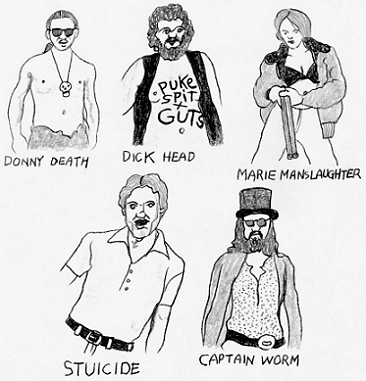
Puke Spit & Guts waren Punk, yeah, aber Punk, der mehr nach 60er Jahre Garage als nach 70er Jahre Punk klingt. Mehr Steppenwolf als Sex Pistols, aber toll, sehr toll, fast tollwütig, könnte man sagen. Die Band war anscheinend in Los Angeles beheimatet und hat 1980 bei Important Records ihr einziges Album "Eat Hot Lead" veröffentlicht. Der kürzeste Song auf "Eat Hot Lead" ist "But I Love Her" mit einer Länge von 1 Minute und 6 Sekunden und der längste "Scratch’n’Sniff" mit 2 Minuten und 59 Sekunden. Die Band bestand aus Marie Manslaughter (Vocals), Captain Worm (Vocals, Guitar, Bass, Percussion), Donny Death (Vocals, Guitar, Bass, Percussion, Harmonica), Dick Head (Guitar, Bass) und Stuicide (Drums). Wer sich hinter diesen Namen verbirgt und was diese Menschen danach noch so getrieben haben, konnte ich leider nicht herausfinden. Schade. Jedenfalls nannte man diese Art von Punkmusik in den USA Biker Punk. Born to be wild, yeah. All set, of course, to 3 chord sub-standard riffage with just a hint of chooglin' boogie woogie grease. Marie Manslaughter singt im Song "You Ain’t Never": I love to fuck, I love to suck, on the roof or in your truck, but you ain't never gonna fuck me in my ass. Den Song kann man sich bei youtube anhören oder bei wfmu’s beware of the blog downloaden. Habe bei der Suche nach mehr Informationen über Puke Spit & Guts im Netz ein Foto gefunden, das die Eingangstür eines Friseurladens zeigt, auf der folgende Preisschilder prangen, Men's Haircut 2.75, Ladys' Haircut 2.75 und Punk Haircuts Any Style 2,75. Weiters fand ich einen Zeitungsausschnitt mit einem "Guide To The Cults": Skinheads: Have convict-style cropped hair and wear bovver boots. Dance the Moonstomp to reggae music. Enjoy fighting. Mods: Very clean. Wear mohair suits, ride scooters and enjoy Tamla Motown music. Bowies: Imitate David Bowie in dress and musical taste. Rude Boys: Wear pork pie hats and trilbys. Follow ska music. Some are enthusiastic vandals. Punks: Out to shock through their appearance and behaviour. Have anarchist leanings. Roots Boys: West Indian-based movement. Smart dressers, good dancers, and anti-police. Alles klar. Über Puke Spit & Guts hab ich leider nichts mehr gefunden, dafür um so mehr über HADACOL, eine Art Multivitaminsaft mit viel Alkohol. Er wurde Ende der 40er Jahre von Dudley J. LeBlanc gemixt und bald darauf im großen Stil bei so genannten Medicine Shows verkauft. HA steht für HAppy, DA für DAys, CO für COmpany und L für LeBlanc, naja, OL war auch ein Hinweis darauf, das der Saft viel AlkohOL enthält. Dudley J. LeBlanc war weder Arzt noch Apotheker, sondern ein Mensch mit ausgeprägtem Geschäftssinn, ein Werbespruch für HADACOL lautete: Don't Be Satisfied With Symptomatic Relief! It's Possible to RELIEVE THE CAUSE OF YOUR AILMENTS When Lack Of Vitamins B1, B2, Iron and Niacin Cause Stomach Disturbances, Gas, Heartburn, Indigestion, Nagging Aches and Pains, and Certain Nervous Disorders. HADACOL war bald sehr beliebt und die American Medical Association warnte bereits 1951: It is hoped that no doctor will be uncritical enough to join in the promotion of Hadacol. It is difficult to imagine how one could do himself or his profession greater harm from the standpoint of the abuse of the trust of a patient suffering from any condition. Hadacol is not a specific medication. It is not even a specific preventive measure. Dudley J. LeBlanc machte, nachdem HADACOL so nach und nach in Misskredit geriet, bald darauf mit anderen Dingen Geschäfte. In Groucho Marxs Radioshow "You Bet Your Life" antworte Dudley J. LeBlanc auf die Frage, wofür Hadacol eigentlich gut war: It was good for five and a half million for me last year. HADACOL war ein paar Jahre so beliebt, dass es auch Spuren in der Popmusik hinterließ, deshalb kommen jetzt meine 6 Lieblings-HADACOL-Songs. Yeah! 1) "Drinkin' Hadacol (Vocal & Piano Version)" 1949 von Little Willie Littlefield, 2) "Everybody Loves That Hadacol (Cajun Version)" 1951 von den Basin Street Six, 3) "My Hadacol Gal" 1949 von Ellis Stroud, 4) "Hadacol Bounce" 1950 von Roy Byrd & His Blues Jumpers, 5) "Hadacol Corners" 1952 von Slim Willett & The Brush Cutters und 6) "La valse de Hadacol" 1951 von Happy & The Doctor & The Hadacol Boys. Roy Byrd ist Professor Longhair, der mit bürgerlichem Namen Henry Roeland Byrd hieß. Proffesor Longhair starb 1980 im Alter von 61 Jahren. Happy oder Happy Fats ist Leroy LeBlanc, ein Cajun Sänger und Gitarrist, wie und ob er mit Dudley J. LeBlanc verwandt war, weiß ich nicht, aber ist durchaus anzunehmen. Leroy 'Happy Fats' LeBlanc starb 1988 im Alter von 73 Jahren und Dudley J. LeBlanc, der auch als Politiker im Louisiana State Senat tätig war und drei Mal um den Posten des Senators von Louisiana kandidierte, starb 1971 im Alter von 77 Jahren. Für Langlebigkeit war HADACOL anscheinend kein Garant, aber vielleicht haben Professor Longhair, Leroy und Dudley LeBlanc auch gar kein HADACOL getrunken, wer weiß, wer weiß. Ich trinke Bier für die Gesundheit. Prost!